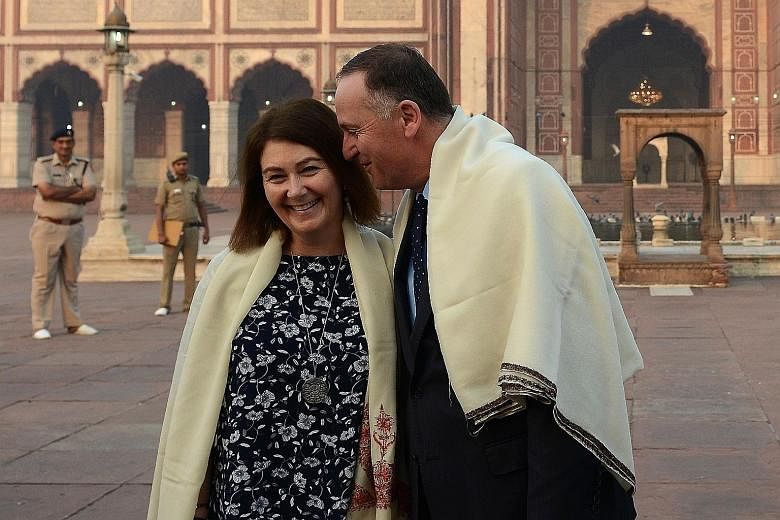WELLINGTON • New Zealand Prime Minister John Key has made a habit of doing the unexpected during his political career, and he stayed true to form yesterday when he resigned abruptly.
A millionaire former banker who exudes an everyman appeal with voters even after eight years in power, the 55-year-old was expected to win a record-equalling fourth term next year. Instead, he announced he was stepping down and throwing open the leadership of his centre-right National Party.
"All I can say is that I gave it everything I had, I have left nothing in the tank," he told reporters.
New Zealand political commentator Matthew Hooton said it was typical of Mr Key that he wanted to leave on his own terms, rather than cling to power as long as possible.
"The one thing about him; while he's an incredibly skilled politician, clearly there has always been an element of the anti-politician within him," he told Radio New Zealand.
-
PM Lee posts his reaction
-
In a Facebook posting, Prime Minister Lee Hsien Loong reacted to the decision of his New Zealand counterpart to resign.
"As PM, Mr Key and his team dealt with some major challenges, including the global financial crisis and the 2011 Christchurch earthquake. His leadership helped transform New Zealand into a resilient and vibrant economy, and he has now given his successor the best chance of taking over and building on his achievements.
We have worked closely on defence, economic cooperation and regional issues. Mr Key was a strong advocate of the Trans-Pacific Partnership (TPP). Singapore and New Zealand are two of the four countries which formed the P4, the small FTA that led to the much more ambitious TPP.
In his eight years as PM, John and I became good friends. He had lived and worked in Singapore before, and has a soft spot for chilli crabs. We saw eye-to-eye on many issues, and got on very well. I shall miss John at international meetings. I wish him and his family all the best for the future.
- LHL
The son of a poor, widowed Jewish refugee mother and brought up in government housing, Mr Key has made much of his humble origins.
He said when he entered Parliament in 2002 that his mother had always taught him that "there's no substitute for hard work and determination".
He came to politics late, winning his seat after a successful career in the financial markets that saw him become global head of foreign exchange for Merrill Lynch. Just four years later, Mr Key became leader of the National Party. By 2008, he had ended nine years of Labour Party rule, ousting prime minister Helen Clark.
He quickly demonstrated that behind the affable exterior was an acute political operator, a man who ensured that the Nationals adopted moderate economic policies rather than the ideological campaigns against welfare and unions the party had pursued in the 1990s.
"What he has been able to do is demonstrate that if you make the case for reform clearly, cogently, persuasively, you can win and retain strong public support for economic reform," Australian Prime Minister Malcolm Turnbull said.
Mr Key "has done an extraordinary job for New Zealand", he added.
Arguably his finest moment came in the wake of a devastating earthquake in Christchurch in 2011 that claimed 185 lives, when his calm leadership helped settle a shocked nation.
"I've always been a glass half-full as opposed to a glass-half-empty (person) and the day that changes is the day I should leave," he said at the time.
While there were mis-steps - notably a failed attempt earlier this year to ditch Britain's Union Jack from the New Zealand flag - Mr Key's approval ratings remained stubbornly high. That characteristic frustrated political opponents, including Internet mogul Kim Dotcom, who formed his own party in 2014 in an attempt to unseat the man he blamed for his legal woes.
"The Prime Minister could be photographed shooting little kittens in his garden with a shotgun and still be popular," Dotcom tweeted after his bid failed.
Even allegations of dirty tricks against members of his staff did not tarnish Mr Key's reputation at the last election, when the Nationals' campaign was squarely based on his personal popularity.
The presumptive next leader, Deputy Prime Minister Bill English, paid tribute to Mr Key "as one of New Zealand's greatest leaders".
"Through good times and bad, his strong leadership has been steadfast and this is a more confident, successful and self-assured country because of his contribution," said Mr English, who is also Finance Minister.
Economic Development Minister Steven Joyce, Climate Change Issues Minister and Associate Finance Minister Paula Bennett, and Police and Corrections Minister Judith Collins are also considered contenders for the leadership that will be decided on Dec 12.
But Mr Key's departure throws the 2017 election wide open.
The centre-left Labour Party leader Andrew Little said he is looking forward to the contest, but understood Mr Key 's decision.
"Politics requires much sacrifice - we may all be politicians, but not all our lives are politics," he said.
AGENCE FRANCE-PRESSE, XINHUA

